

Beyond Bubble: A Comprehensive Guide to NoCode Platforms in 2025
Published on March 17 2025
Written by Jaren Hidalgo · 13 minute read
Interested in exploring Bubble alternatives? While Bubble has been a significant force in the NoCode space, each platform comes with its own set of features and strengths. This guide aims to introduce you to various alternatives, each offering unique capabilities that might better align with your specific project requirements.
NoCode platforms enable the creation of various internal business apps, emphasizing their functionality in automating business processes and streamlining operations.
When choosing a NoCode platform, it’s essential to consider factors such as scalability, integration capabilities, and the specific needs of your business. By selecting the right platform, you can ensure that your applications are not only functional but also scalable and adaptable to future needs. In this section, we will explore the world of NoCode platforms, their benefits, and what to look for when choosing the right one for your business.
Key Takeaways
Exploring alternatives to Bubble can enhance application performance and mobile compatibility.
Choosing the right NoCode platform requires assessing project needs, scalability, and user-friendliness.
Platforms like Glide, Adalo, and Webflow offer unique strengths tailored for specific project goals.
Considering the price of NoCode platforms is crucial when evaluating alternatives, as costs can increase with application growth and competitive pricing should be taken into account.
Why Explore Alternatives to Bubble?
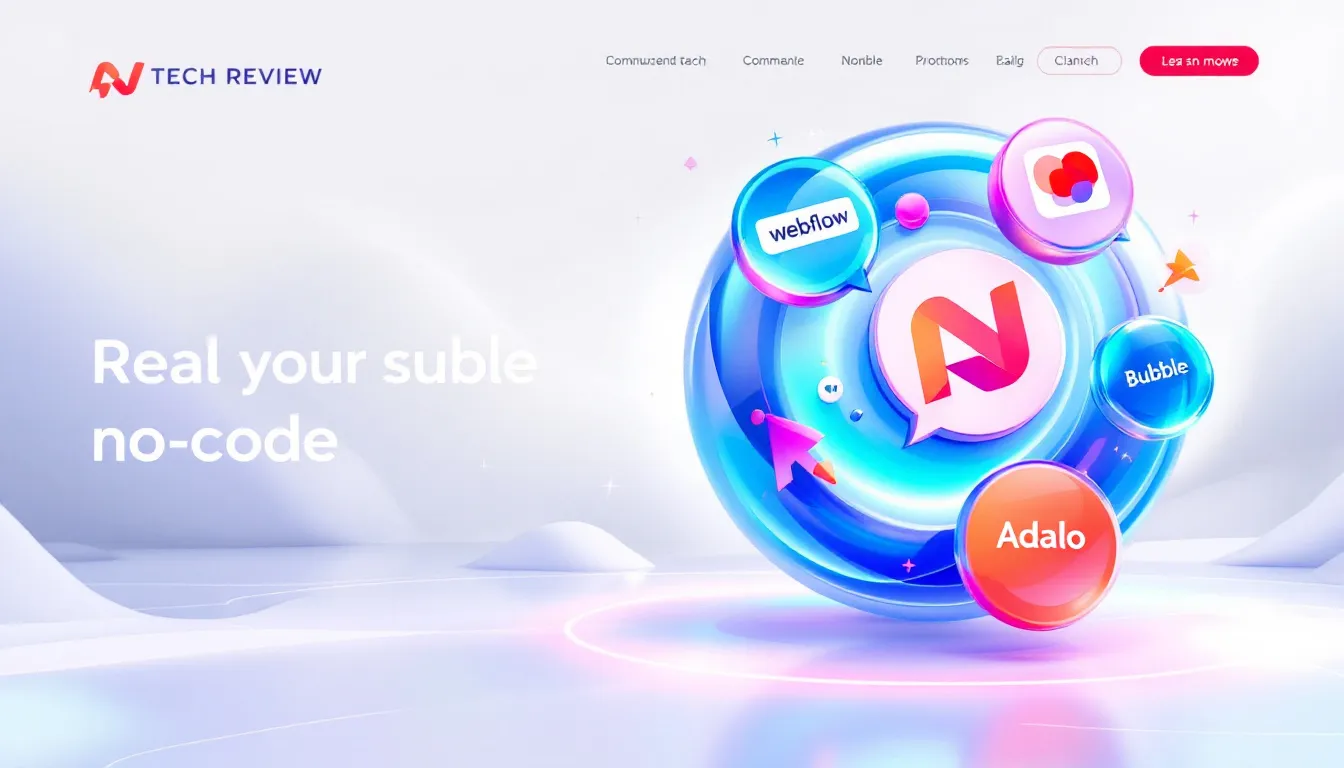
Bubble has been a game-changer in the NoCode arena, but it’s not without its drawbacks. One major limitation is its lack of native mobile app support, which can significantly hinder the reach and user experience of your applications on mobile devices. Additionally, users have reported performance issues, especially with backend processing and API calls, leading to slower response times and unreliable data handling. These factors can negatively impact user satisfaction and overall application performance.
Recognizing these limitations is essential. Although NoCode platforms provide significant flexibility, they might not fulfill every project’s requirements immediately. Exploring alternative platforms or seeking additional developer support can address these challenges, ensuring optimal application performance.
Criteria for Choosing the Right NoCode Platform
Choosing the appropriate NoCode platform is a critical decision that can determine your project’s success. Key project requirements include understanding the specific functionality you need and the intended use of the platform. For projects centered on extensive mobile app development, a platform specializing in this area is necessary.
Technical factors are also significant. Scalability is needed to support project growth, and integration with existing tools is vital for smooth operation. Additionally, platforms with a user-friendly interface and a minimal learning curve facilitate quick adoption by teams without extensive training.
Ultimately, choosing the right NoCode platform can greatly affect project outcomes and long-term success. Evaluating your requirements, technical needs, and available resources is crucial for making an informed choice. Many platforms provide free trials, offering a chance to test their features and compatibility with your project needs.
Key Features to Look for in a NoCode Platform
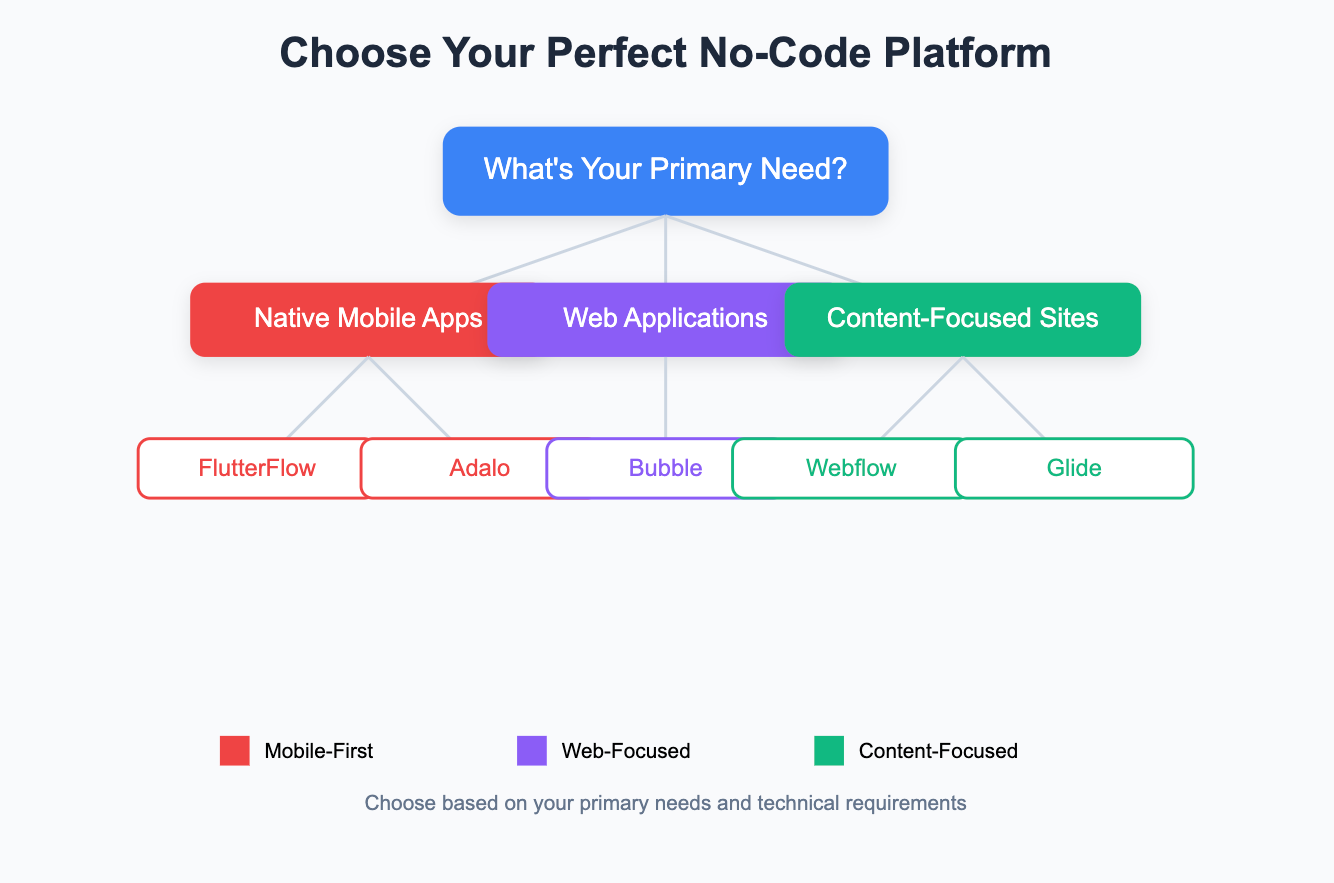
When selecting a NoCode platform, there are several key features to consider. These features will ensure that your platform meets your business needs and provides a seamless user experience.
Security and Compliance
Security and compliance are top priorities when it comes to NoCode platforms. Look for platforms that offer robust security measures, such as encryption, secure authentication, and regular security audits. Ensure that the platform complies with relevant regulations, such as HIPAA, GDPR, and CCPA. A secure platform will protect your business data and ensure that your applications meet the required standards. This is particularly crucial for businesses handling sensitive information, as it ensures that data is safeguarded against breaches and unauthorized access.
Data-Centric Approach
A data-centric approach is essential for NoCode platforms. Look for platforms that offer flexible data modeling, a well-developed database of integrations, and the ability to connect to various data sources, such as MySQL, MongoDB, and existing systems. A data-centric platform will enable you to create custom internal tools, automate workflows, and make data-driven decisions. The ability to seamlessly integrate with different databases and existing systems ensures that your applications can leverage existing data and infrastructure, enhancing their functionality and efficiency.
Friendly UI
A user-friendly interface is crucial for NoCode platforms. Look for platforms that offer a drag-and-drop interface, pre-built components, and a visual development environment. A friendly UI will enable you to design and deploy applications quickly, without requiring extensive coding knowledge. Ensure that the platform is accessible to both technical and non-technical users, making it easy to collaborate and work together. This accessibility is vital for fostering teamwork and ensuring that all stakeholders can contribute to the development process.
By considering these key features, you can choose a NoCode platform that meets your business needs and provides a seamless user experience. Whether you prefer a LowCode tool or a NoCode platform, there are many options available, each with its unique strengths and pricing plans. Selecting the right platform will empower your business to innovate and create powerful applications without the need for extensive coding expertise.
Comparison of Top Bubble Alternatives
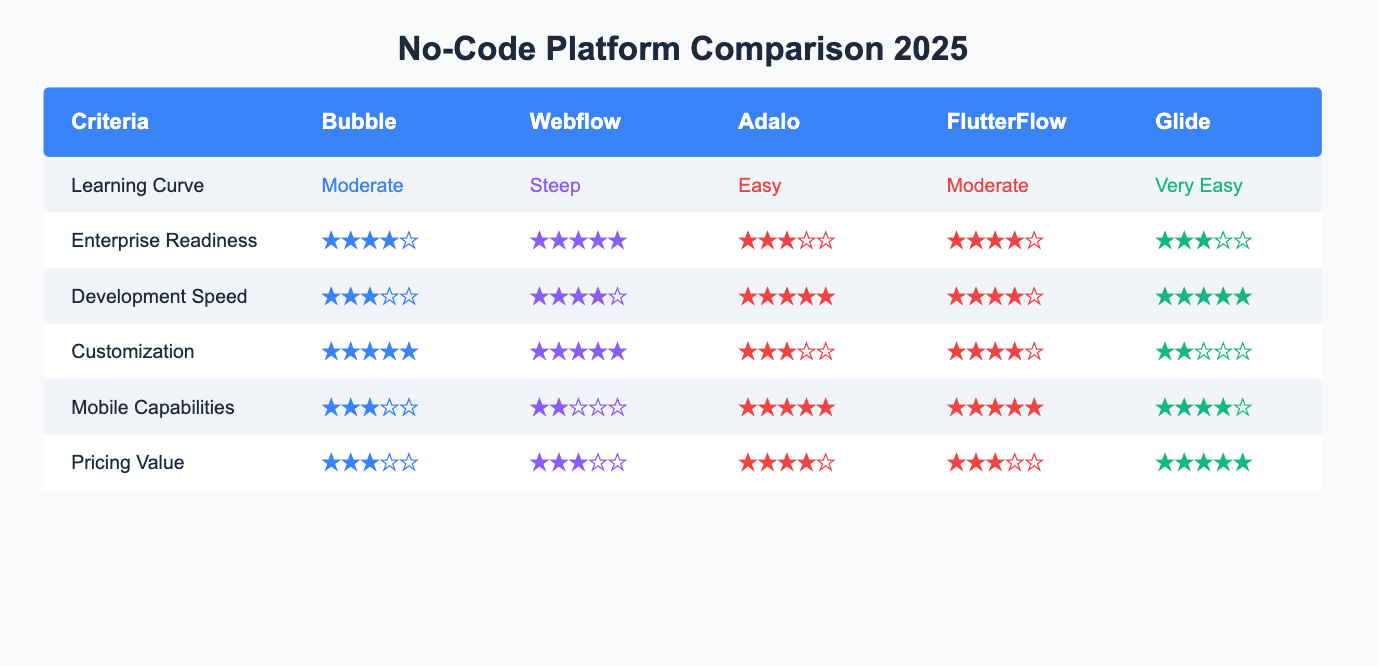
Exploring alternatives to Bubble.io can reveal numerous possibilities, offering options tailored to specific requirements. Many users seek a Bubble alternative to explore additional features and capabilities that might better suit their specific project needs.Some of the top contenders in the NoCode space include WeWeb, Webflow, and Softr, each bringing unique strengths to the table.
For instance, WeWeb helps increase development speed and reduce costs while allowing for prototyping complex applications. On the other hand, Webflow stands out with its robust design tools, making it an excellent choice for creating visually appealing websites. Softr provides both free and transparent pricing plans, making it accessible for individuals and small businesses.
Comparing these platforms helps users find the best NoCode Bubble alternatives suitable for their project needs. For native mobile applications, quick development, or data-driven apps, a suitable platform exists for every need.
Top Picks for Bubble Alternatives
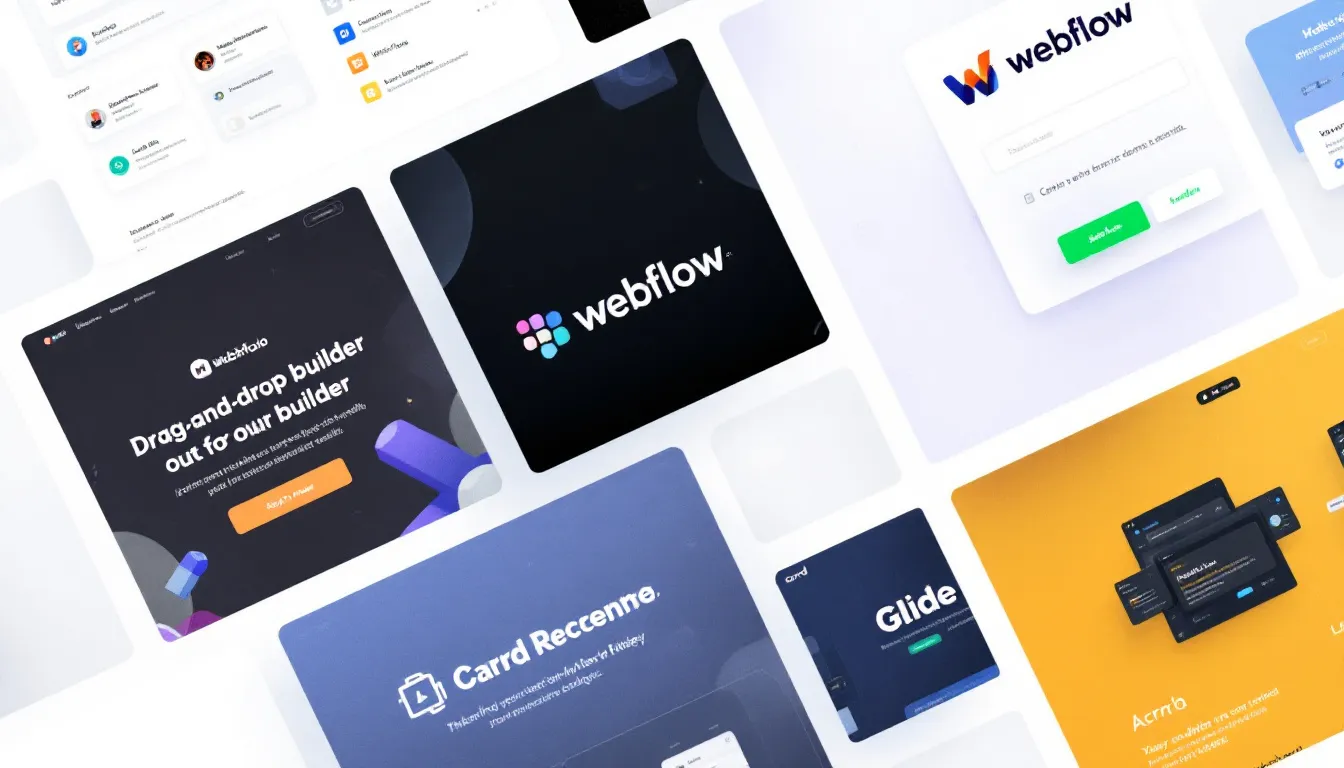
Several platforms stand out for their unique capabilities and ease of use when choosing NoCode Bubble alternatives. Glide, Adalo, and FlutterFlow are among the top picks, each offering distinct features that cater to different development needs. These platforms allow users to create and launch applications in just a few days, making them ideal for those who want to minimize development time while maximizing functionality.
Grasping the total cost of ownership is important, as potential expenses beyond initial fees can influence your decision. We will now explore what makes these platforms exceptional.
Glide
Glide transforms spreadsheets into mobile apps, making it an excellent choice for businesses looking to create data-driven applications quickly. With its intuitive drag-and-drop interface, Glide allows users to develop mobile apps without any technical knowledge, ideal for rapid prototyping and internal tools. This interface enables users to easily integrate various interface elements, including buttons, into their applications. However, it does have limitations, such as limited customization options and lack of support for native app development or code export.
Even with these limitations, Glide is well-suited for small businesses looking to create dashboards, inventory software, and other data-driven applications. Its dependency on Google Sheets ensures seamless data integration, making it a powerful tool for those familiar with spreadsheet-driven development.
Adalo
Adalo excels in quick mobile app development, offering an intuitive drag-and-drop interface that simplifies the app development process. This makes it an attractive option for startups and small businesses with limited resources, as its entry-level plans are cost-effective and accessible. However, Adalo’s customization options are somewhat limited, which might be a drawback for projects requiring highly customized features or complex logic. Additionally, unlike Bubble, which only supports JavaScript for custom integrations and lacks support for other programming languages like Python, Adalo provides a more straightforward approach for non-technical users.
Overall, Adalo is ideal for developing native mobile apps quickly and efficiently without complex coding.
FlutterFlow
FlutterFlow is distinguished by its focus on native mobile app development and its capability to export source code, providing better flexibility and control over the final product. This platform offers extensive customization options and integration capabilities with third-party services like Firebase and Stripe, making it ideal for unique applications.
Although FlutterFlow excels in native mobile applications and supports real-time developer collaboration, it lacks a built-in workflow automation builder and advanced features for large applications. However, its native performance and code export capabilities make it a strong contender in the NoCode landscape.
Enterprise-Grade NoCode Platforms
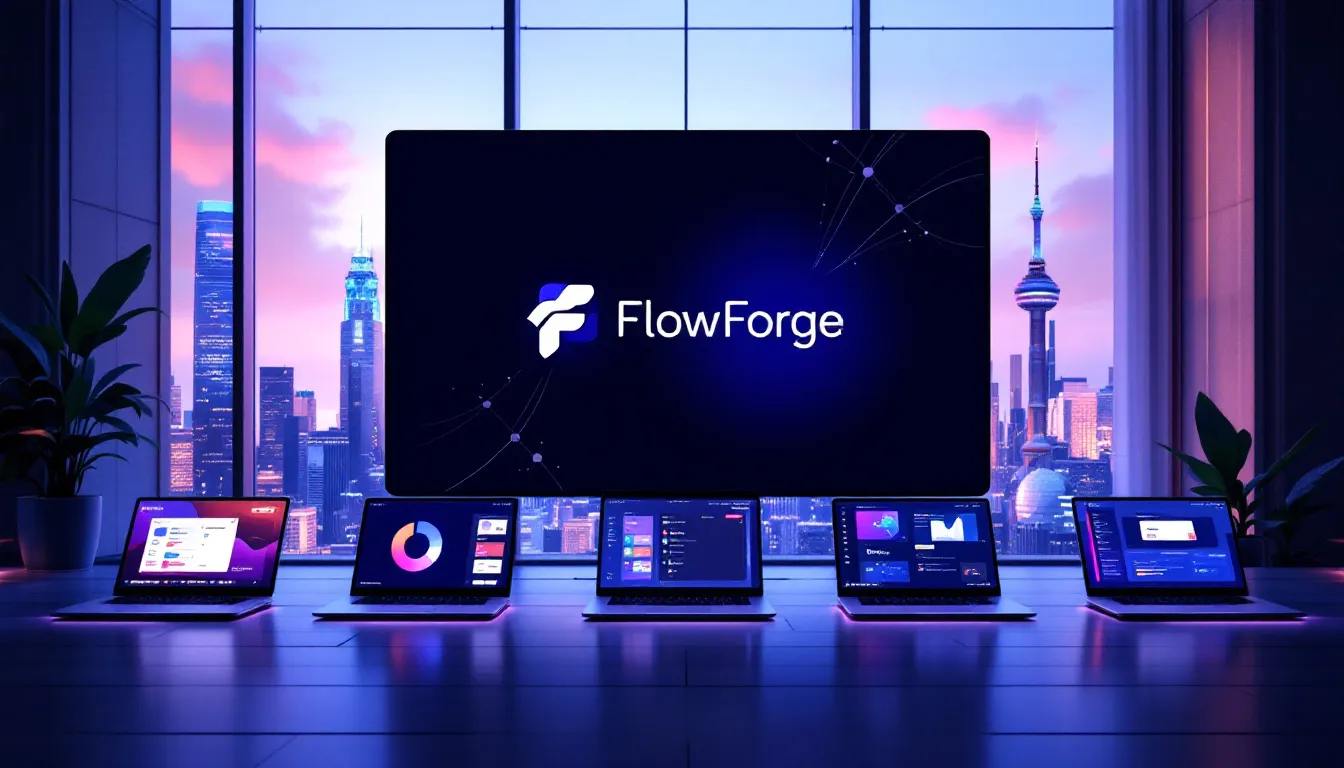
Enterprise-grade NoCode platforms cater to the stringent requirements of large organizations, ensuring data protection with robust security features. Platforms handling sensitive information must comply with regulations making certifications like SOC 2 essential.
These platforms enable the creation of customizable internal business apps to meet enterprise needs, facilitating complex web and mobile app development with minimal technical skills. Platforms like FlutterFlow and Adalo are suitable for native mobile application development, providing flexibility and scalability for enterprise-level projects.
Enterprise clients typically require advanced security features, compliance certifications, and scalability options from platforms like Webflow Enterprise. Such features ensure the platform can manage complex applications and effectively protect sensitive user data with enterprise grade security.
Softr
Softr is designed for NoCode application development, focusing on dynamic, database-driven applications like web applications and client portals. It offers over 30 pre-built templates and real-time updates with Airtable, enabling users to create applications with ease and speed.
Softr’s drag-and-drop interface permits extensive customization of design and layout, making it accessible to both experienced developers and non-technical users. Its integration with various data sources like Airtable and Google Sheets, along with user authentication for security, provides greater flexibility and scalability compared to Bubble.
Specialized NoCode Platforms
Specialized NoCode platforms are tailored to meet the unique needs of various industries, enhancing productivity and innovation. These platforms enable users to create tailored business apps that streamline operations and foster growth. For instance, Webflow is best suited for professional websites and content-heavy applications, offering unmatched design flexibility and excellent SEO optimization tools.
Choosing the right specialized platform is vital for a project’s success, as it directly influences design capabilities and user experience. These platforms meet the unique needs of various industries, enabling businesses to streamline operations and foster growth.
Webflow
Webflow is renowned for its design flexibility, making it ideal for professional websites and content-heavy applications. Its key strengths include professional-grade animations, robust CMS capabilities, and excellent SEO optimization tools, which help create visually stunning and highly functional web applications.
However, Webflow has a steep learning curve for advanced features and higher pricing for its premium functionalities. Although it provides clean, exportable code, its application logic capabilities are limited. Despite these drawbacks, Webflow remains a top choice for creating professional web apps with advanced customization options.
WeWeb
WeWeb emerges as a strong alternative to Bubble, particularly for those seeking enhanced development speed and cost efficiency. This platform is designed to facilitate the rapid prototyping of complex applications, making it an attractive option for businesses looking to innovate quickly without the overhead of traditional coding.
WeWeb's user-friendly interface and integration capabilities allow users to create web applications with ease, leveraging pre-built components and data integration. It supports the development process by enabling users to integrate custom code when necessary, offering a balance between NoCode and LowCode solutions. This flexibility ensures that even complex data-driven applications can be developed efficiently, meeting both business and technical requirements.
Furthermore, WeWeb's focus on performance and scalability addresses some of the limitations users experience with Bubble, such as slow processing and lack of mobile app support. With its robust security features and enterprise-grade capabilities, WeWeb is well-suited for projects that demand both speed and reliability, making it a compelling choice for those exploring Bubble alternatives.
Real-World Use Cases
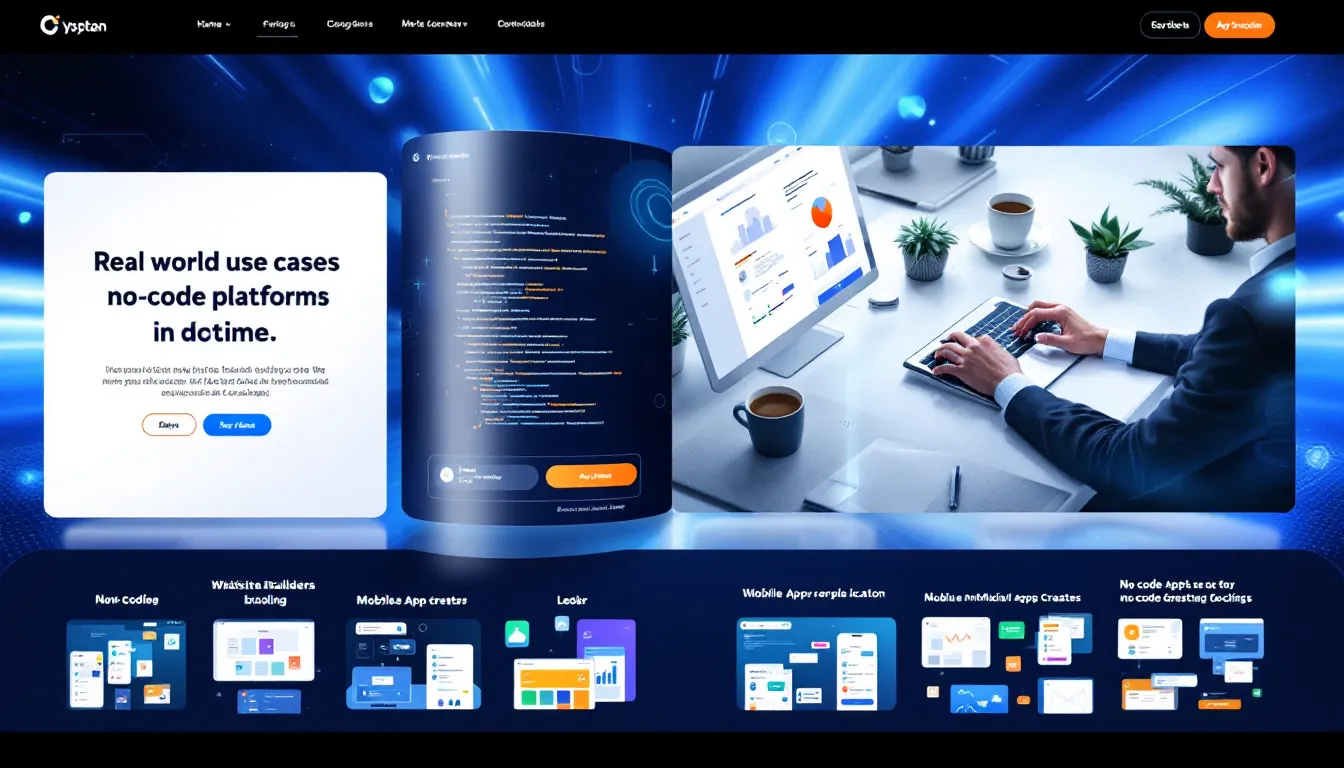
NoCode platforms have empowered small businesses to build customized e-commerce websites without coding expertise, demonstrating their potential for business operations. They have also enabled businesses to build customized business apps for various operational needs, such as customer support, approval workflows, and analytics.
For instance, Pay Ewe, a peer-to-peer payment platform in Australia, partnered with Kreante to develop a secure system using Bubble. This platform includes an escrow system and Connect ID integration, significantly reducing scam risks in online transactions. The rapid development and enhanced security features have earned Pay Ewe positive user feedback and award nominations in the fintech space.
Decathlon SE, a global sporting goods leader, tackled the challenge of spare parts identification by developing a digital tool using WeWeb and Xano. This tool enhances customer experience by guiding users to find compatible parts for their sports equipment, promoting sustainability and increasing online sales.
Laboratoria, a social enterprise in Latin America, collaborated with Kreante to create Laboratoria+, a career development platform for women, using Bubble. This platform offers online courses, mentoring sessions, and career resources, launched within two months, showcasing NoCode's efficiency in supporting social impact initiatives.
These examples illustrate the effectiveness of NoCode platforms like Bubble, WeWeb, and Xano in developing secure, user-friendly applications quickly and affordably, empowering businesses to innovate and meet specific market needs.
3 Expert Tips for Success with NoCode Platforms
Prototype your ideas: Beginning with a prototype helps identify core functionalities and gather user feedback early, ensuring the final product meets user needs. Creating prototypes quickly, often in just a few days, allows for rapid iteration and improvement. Using self-help resources such as tutorials and community forums offers valuable support and guidance during the NoCode development journey.
Use pre built app functionaity: Using pre-built app functionality can boost app development efficiency, offering options for common features like user authentication and data storage. To extend app functionality, a user-centered design approach throughout development is essential for ensuring a positive user experience and engagement.
Create a launch strategy: Creating a launch strategy from the beginning ensures the app’s accessibility across major app stores, maximizing its reach and impact.
Conclusion
In the dynamic realm of NoCode platforms, exploring alternatives to Bubble can unveil new opportunities for your projects. Platforms like Glide, with its data-driven applications, and FlutterFlow, known for native app capabilities, offer distinct strengths. Many NoCode tools now incorporate AI functionalities, such as Webflow's AI site builder and assistant, enhancing development through automation and intelligent insights. By evaluating your specific needs, technical requirements, and budget, you can select the ideal platform to realize your ideas. A multi-platform strategy can further amplify your project's versatility by leveraging each platform's unique capabilities. At Kreante, we've successfully implemented over 125 NoCode projects, achieving key performance indicators across various platforms. It's vital to consider the pricing of NoCode platforms, as costs can vary and impact your budget. Ultimately, the best platform is one that aligns with your requirements, budget, and goals. Reach out to our team for personalized consultation to make the right choice for your project.
Need Expert Guidance?
At Kreante, we specialize in NoCode development across various platforms, offering tailored solutions to meet your unique needs. Our team is equipped to help you evaluate platform options, develop applications using the most suitable platform, and provide ongoing support and maintenance. By choosing platforms that support multiple programming languages, we ensure flexibility and future scalability for your projects. Whether you're new to NoCode or looking to enhance existing projects, our expertise is here to guide you. Stay informed with our blog for the latest NoCode/LowCode trends, and contact us for a free consultation to bring your project to life with the ideal NoCode solution.










